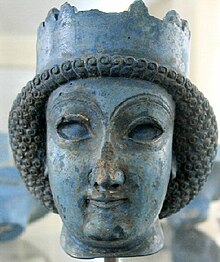

| Amestris | |
|---|---|

Likely bust of an Achaemenid woman, perhaps Amestris
| |
| Queen consort of the Achaemenid Empire | |
| |
| Died | c. 440 BC |
| Spouse | Xerxes I |
| Issue | Darius Hystaspes Artaxerxes I Amytis Rhodogyne |
| House | Achaemenid |
| Father | Otanes |
| Religion | Zoroastrianism[1] |
Amestris (Greek: Άμηστρις, Amēstris, perhaps the same as Άμαστρις, Amāstris, from Old Persian Amāstrī-, "strong woman")[2] was an Achaemenid queen, wife of king Xerxes I and mother of king Artaxerxes I.[3][4]
She was poorly regarded by ancient Greek historians.[5][6][7]
Amestris was the daughter of Otanes, one of the seven noblemen reputed to have killed the magus who was impersonating King Bardiya in 522 BC. After this, Darius I the Great of Persia assumed the throne. According to Herodotus, Otanes was honoured with royal marriages. Darius I married Otanes' daughter Phaedymia while Otanes married a sister of Darius, who gave birth to Amestris.
When Darius died in 486 BC, Amestris was married to the crown prince, Xerxes. Herodotus describes Amestris as a cruel despot:
I am informed that Amestris, the wife of Xerxes, when she had grown old, made return for her own life to the god who is said to be beneath the earth by burying twice seven children of Persians who were men of renown.
— Herodotus, Histories 7.114
The origin of this story is unclear, since known records and accounts indicate that human sacrifices were not permitted within the Persian religion. Also since most accounts of the time are from Greek sources, and due to the involvement of Greece as an opponent of Persia, it is possible that not all accounts are accurate.
Circa 478 BC, her son Crown Prince Darius was married to his cousin Artaynte at Sardis. She was the daughter of Xerxes' brother Masistes. At the behest of Xerxes, Artaynte committed adultery with him (Xerxes). When Amestris found out, she did not seek revenge against Artaynte, but against her mother, Masistes' wife, as Amestris thought that it was her connivance. On Xerxes' birthday, Amestris sent for his guards and mutilated Masistes' wife by cutting off her breasts and threw them to dogs, and her nose and ears and lips also, and cutting out her tongue as well. On seeing this, Masistes fled to Bactria to start a revolt, but was intercepted by Xerxes' army who killed him and his sons.[8]
| Hystaspes | |||||||||||||||||||||||||||||||||||||||||||||||||||||||||||
| Darius I 522–486 BCE | A daughter | Otanes | |||||||||||||||||||||||||||||||||||||||||||||||||||||||||
| Masistes | Xerxes I 486–465 BCE | Amestris | |||||||||||||||||||||||||||||||||||||||||||||||||||||||||
| Artaynte | Darius | Hystaspes | Artaxerxes I 465–424 BCE | Achaemenes (?) | Rhodogune | Amytis | |||||||||||||||||||||||||||||||||||||||||||||||||||||
Amestris is a character in the opera SersebyGeorge Frideric Handel (italianized as "Amastre"). In the opera, Amestris is about to marry Xerxes (Serse), yet he falls in love with another woman and wants to marry her instead. Amestris disguises herself as a man in order to be near him. At the end of the opera, Xerxes is sorry for the things he did and asks Amestris once more to be his wife.[9]
|
| |||||||||||||||||||||||||
|---|---|---|---|---|---|---|---|---|---|---|---|---|---|---|---|---|---|---|---|---|---|---|---|---|---|
| |||||||||||||||||||||||||
| |||||||||||||||||||||||||
| |||||||||||||||||||||||||
| |||||||||||||||||||||||||
| |||||||||||||||||||||||||